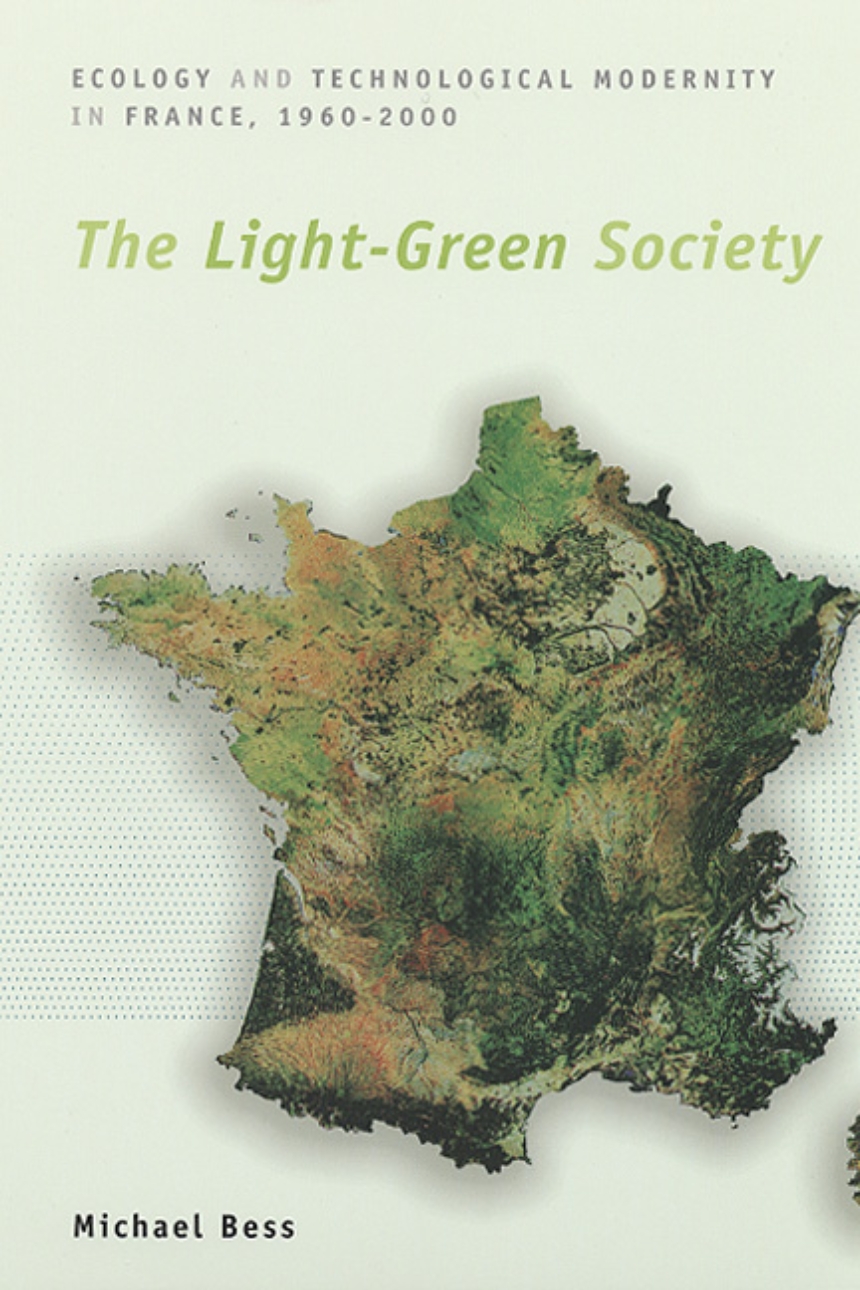The Light-Green Society
Ecology and Technological Modernity in France, 1960-2000
The Light-Green Society
Ecology and Technological Modernity in France, 1960-2000
The Light-Green Society limns sharply these trends over the last fifty years. The rise of environmentalism in the 1960s stemmed from a fervent desire to "save" wild nature-nature conceived as a qualitatively distinct domain, wholly separate from human designs and endeavors. And yet, Bess shows, after forty years of environmentalist agitation, much of it remarkably successful in achieving its aims, the old conception of nature as a "separate sphere" has become largely untenable. In the light-green society, where ecology and technological modernity continually flow together, a new hybrid vision of intermingled nature-culture has increasingly taken its place.
387 pages | 4 halftones, 4 line drawings | 6 x 9 | © 2003
Biological Sciences: Ecology
Culture Studies:
Earth Sciences: Environment
Economics and Business: Economics--History
History: European History, History of Ideas
Sociology: Social Change, Social Movements, Political Sociology
Reviews
Table of Contents
Acknowledgments
Part I - The Postwar Acceleration
Introduction
1. Nukes, Concordes, and Anxiety
The French "Special Relationship" with High Technology
Ambivalent Modernity
Europe’s Nuclear Macho? Perceptions of France as a Relatively "Ungreen" Nation
The Postwar Boom: Continuity vs. Discontinuity
Technological Darwinism
The Great Renewal
Machine/Symbol: The Concorde
The Role of Nuclear Technology within the National Discourse of Anxiety
French Perceptions of the Rainbow Warrior Affair
2. Endangered Species: The French Peasant
The Rural Future: A Key Issue for the French Greens
Machine/Symbol: Le Cheval Vapeur (Farm tractor, or "Steam-Horse")
The Cultural Backlash: In Search of a New Rural Balance
Territorial Balancing
French Uniqueness, French Ordinariness
Part II - The Rise of Ecology
3. The Prehistory fo Ecological Awareness
Environmentalism and Ecology: Working Definitions
Nineteenth-Century Precursors in France: From "Acclimatation" to Conservation
From Unity to Beauty: The Early Twentieth Century
1945-1960: Warnings Unheeded
4. The Unexpected Trajectory of Environmentalist Success
1960-1974: Taking it to a New Level
1974-1981: Eco-Quixote vs. Electricité de France
Machine/Symbol: The Nuclear Reactor
1981-1989: Entering the Political Fray
1989-present: "Tous Verts!"—"We are all environmentalists!"
5. Nuances of Dark Green
The Intellectual Horizons of French Environmentalism
A Revolution against the Industrial Revolution
The Two Main Currents of French Green Thought
Social Environmentalism: Four Interlocking Agendas
What Is Distinctive about the French Green Visions?
6. What Might It Actually Look Like?
The French Green Utopia: A Guided Tour
Machine/Symbol: The Wind Turbine
Part III - A Society Goes Light-Green
7. The Dual Nature of Light-Green
Nature Penetrating into Society—Machine/Symbol: The Train à Grande Vitesse
Society Penetrating into Nature—Machine/Symbol: Brittany’s Pointe du Raz
8. Greening the Mainstream Consumer
Ironic Twists of a Partial Revolution
Surface Change and Deep Change
Back to Nature
Eco-consumerism: The Overflowing Cornucopia of "Less is More"
Eco-labels and "Eco-Friendliness"
9. The Environmentalization of the State
Anti-statism, More Government
The Layer Cake of Green Governance: Six Levels, Three Modes
Key State Actors, Key Legal Turning-Points
10. Industrialists as Ecologists
Factories and Big Business: New Constraints, New Strategies
ISO-14000 and Eco-Audit: The Case of an Industrial Pioneer
The New Eco-Professions: Expansion in the Tertiary Sector
11. Elusive Sustainability
A Territorial Balance Sheet
The State of the French Territory: An Ecocentric Perspective
The Anthropocentric Perspective: Is the Light-Green Society Sustainable as a Habitat for Humans?
Part IV - The Future of Nature in a Light-Green World: Long-Term Global Implications
12. The Light-Green Horizon
Broader Implications of the French Story
Humans and Nature on a Shrinking Earth
13. Artificialization and Its Discontents
The Rising Tide of Artifice
Machine/Symbol: Biotechnologies
La Gestion du Vivant: The "Management of All Living Things"
14. The Enduring Mirage of Wilderness
Philosophies of Nature for a Technologically Intensive Age
If Not the Dualism of Nature and Culture, then What?
The Case for Hybridity: A World of Intertwinings
The Case for Dualism: Wilderness as the Irreducible Other
From Wilderness to Wildness: A Paradoxical Synthesis
15. The Shifting Landscape of Tame and Wild
Nature Penetrating into Society: Emerging Connectedness
Society Penetrating into Nature: Ambiguous Control
16. A Cosmic Wilderness?
Cousteau’s Grandchildren Swim the Rings of Saturn
Conclusion
The Age of Ecology Arrives (But it is not what anyone expected)
A Planet of Paysage?
Notes
Bibliography
Index
Awards
Society for French Historical Studies: David H. Pinkney Prize
Honorable Mention
American Society for Environmental History: George Perkins Marsh Prize for Environmental History
Won
